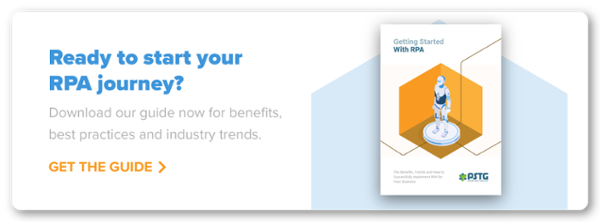10 Most Impactful Benefits of RPA for Your Business
/adult-artificial-intelligence-bot-1020325.jpeg)
IT leaders around the world are turning to Robotic Process Automation (RPA) to increase efficiencies and lower operating costs by reducing cumbersome and time-consuming workloads with a ‘digital’ worker. Deloitte’s annual RPA survey found that 53% of those asked were already utilising some form of RPA. If you’re not part of that group, then you could be falling behind the competition.
Here’s a quick reminder of exactly what RPA is and some of the most impactful benefits your organisation can enjoy after implementation.
/adult-artificial-intelligence-bot-1020325.jpeg?width=600&name=adult-artificial-intelligence-bot-1020325.jpeg)
RPA: An Overview
If you’re already well-versed on what RPA is but you’re interested in the actual benefits your business will see, then skip ahead to the next section.
RPA is applying technology to automate business processes. Digital workers are configured to carry out all kinds of menial tasks, for example, data entry, payroll automation and claims processing.
Depending on the situation, RPA’s involvement in a business can be as simple as generating automated email responses, all the way up to large-scale Enterprise Resource Planning (ERP) systems that are made up of thousands of ‘robots’.
RPA: The Key Benefits for Your Organisation
1. Better Allocate the Time and Energy of Staff
Automating menial tasks through RPA gives staff back the time to work on tasks that are more valuable to the business. In fact, approximately 10-20% of human work hours are spent on repetitive tasks.
By utilising RPA, digital workers deal with this basic work so staff can be assigned to projects that really matter.
2. Staff Can Focus on Rewarding Work
Following on from above, staff want to have these menial tasks reassigned elsewhere. RPA improves employee happiness and overall retention because they can focus on more interesting and challenging work. Staff members that feel engaged are 59% less likely to look for work elsewhere.
3. Fewer Errors Caused by Human Error
Manual errors are unavoidable. People are naturally distracted and make simple mistakes. Some of these are fairly harmless, while others can negatively impact processes and customer relationships.
RPA eliminates mistakes made by humans. Although RPA can bring its own occasional malfunctions if process workflow planning has been insufficient, human error is a thing of the past.
4. Reduced Costs
Although RPA doesn’t have to replace your existing systems, fewer mistakes and streamlining processes can drastically lower costs. It’s estimated that when replacing an FTE (full-time equivalent) with a digital alternative, i.e a robot, processing costs in that instance are reduced by 80%.
This, of course, doesn't mean you're dismissing your employees. You're simply reassigning them to other tasks - ones that they may find more rewarding. When budgeting, RPA ensures that you spend money and resources in the most efficient way.
5. RPA is Eco-Friendly
Entrenched processes at your organisation might still rely on some form of paper or physical documents. Implementing an innovative RPA solution forces digitisation of one kind or another.
45% of paper used in the office finds its way to the bin by the end of the day. To fully benefit from RPA and reduce wasted paper, your business needs to move towards electronic solutions throughout.
6. A 24/7 Workforce
Even with all of the motivation and employee incentives in the world, you’ll struggle to convince staff to work through the night. Fortunately, there’s no such problem when it comes to your new robot workforce. You can program them to work 24 hours a day - no breaks, no fatigue.
This obviously boosts your output and ensures tasks are completed at a much faster rate.
7. Robust Security Measures
Most security breaches originate with a member of staff inadvertently clicking the wrong link or downloading a malicious attachment. These are accidents of course, but they can have serious consequences for your business.
Implementing an RPA solution and using a digital workforce means risks associated with the existing members of staff are reduced. Digital workers can even be programmed to open emails and determine their legitimacy to ensure your business is protected.
8. Immediate Results
As soon as the robots are powered up, your business starts to reap the benefits. Looking over the results of the Deloitte survey we mentioned at the start, businesses that were asked said that RPA had already exceeded expectations in terms of quality, accuracy, compliance, productivity and cost reduction. There’s no lengthy waiting period for positive results.
9. Adjust RPA to Meet Changing Demands
To stay ahead of the competition, your business needs to be as flexible as possible. As consumer demands and project requirements change, you need to adapt accordingly. RPA can be scaled upwards or downwards as needed to accommodate changes.
For example, if the festive season is a busy period for you, the RPA can scale upwards to meet demands. Once we’re into January, it can be easily reduced to normal.
10. Detailed Records and Thorough Analysis
We know how easy it is for record keeping to be overlooked and neglected by busy staff. Without detailed records, it’s difficult to know where improvements can be made. RPA, on the other hand, can automatically keep these records for you. With the information it collates, you can determine how processes are performing and analyse existing strategies.
These are just 10 of the most impactful benefits of RPA. To know exactly how your business can reduce costs and streamline processes, it’s important to speak to experts. They can analyse your existing setup and make tailored recommendations that will resolve the specific challenges you face.
How to Successfully Implement RPA at Your Organisation
For all the essential information on RPA, the latest trends taking the industry by storm and how to start your RPA journey, don’t hesitate to download our free eBook. It’s packed with expert advice from our RPA specialists and will help you to implement an innovative and effective solution.
Get your copy of the eBook now using the link below.




